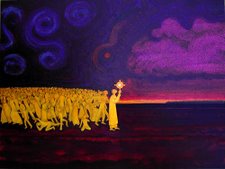[EXCERPT]
...THE LACK AT THE ORIGIN
A Jewish psychoanalytical writer, born in Morocco, Daniel Sibony, has probed the dark side of monotheism. His work can be read in tandem with Karen Armstrong’s work on Jewish, Christian and Islamic fundamentalism. Both writers help Christians to self-knowledge by showing them their own reflection in pathological aspects of Judaism and Islam.
All three religions live by a myth of the purity of their origins, a myth that breeds violence when it is threatened. Each religion offers a supremely satisfying identity, and the last word about the riddles of life and death. But supposing the identity is based on denial, on a papering over of cracks and flaws in its original construction? Some will attain intellectual and spiritual growth by opening up honestly to a recognition of these cracks and flaws. Others will see such honesty as apostasy and will bunker down in traditionalism and absolutism. The repressed insecurity of threatened identity will show itself in hostility to the rival who embodies the threat and becomes a scapegoat, as the Jews were for Christians throughout history. Throughout the centuries each of the three monotheisms proclaimed its own legitimacy in refuting that of the others. This fruitless apologetical debate is itself a fixational behaviour that indicates the true nature of the three religions. The splitting of human community into elect and reprobate, sheep and goats, is an intrinsically violent structure, pervasive in Scripture. The teaching of Jesus, “love your enemies”, and his reaching across barriers to build inclusive community, go against this, but this is a virtuality that has to be drawn out of the texts by dint of careful spiritual and ethical discernment. In time of friction, this aspect of Scripture is ignored; “love your enemies” has hardly been the favoured slogan of the USA since 9/11. Instead the old dualism of good and evil comes into play.
The more relaxed vision of Vatican II marks a certain retreat of the question of identity, under the auspices of an inclusivism invoking the universality of grace and of divine self-revelation, in the spirit of the stories of Cornelius or of Paul’s preaching at Athens in Acts and of the broad Logos-theology of the Apologists and the Alexandrian theologians of the second and third centuries. Unfortunately the spirit of sectarianism has revived as part of the general regression from the vision of Vatican II, tainting various Vatican documents such as Dominus Iesus (2000). The renewed worry about rival claims, which is causing ecumenism to flounder, perhaps indicates that ecumenical idealism about shared origins is bound to collapse back into the old game of “my origin is better than yours”. Sibony proposes an alternative:
.
Perhaps these three monotheistic currents will one day tolerate and pardon one another not because they derive from the same God and are ‘brothers’ (that kind of fraternity produces more wars than agreements, more rendings than ententes), but because they will find in themselves the same deficiency, the same type of infidelity to what founds them; because they will recognize themselves as children of the same original lack: each marked by a flaw at the origin, a flaw imputable to no one, in any case not to one’s neighbour, a flaw intrinsic to the human and which other humans outside the religious field face as best they can. (Les trois monothéismes : Juifs, Chrétiens, Musulmans entre leurs sources et leurs destins , Seuil, 1997, 10)
.
A recognition of lack at the origin has surfaced occasionally in theology, only to meet with sharp repression, notably in the Modernist controversy. Some space must be made for what Dominus Iesus rejects, the sense that Christianity on its own is a broken and incomplete project, which needs to reach out humbly to other spiritual paths to find its proper role. Christ may be complete, but Christianity enjoys in practice only a very partial understanding of Christ and has to work on its legacy of deadly misunderstandings.
Recognition of the historical and unfinished nature of the Christian, Jewish and Islamic projects, and of the violent foreclosures that launched all three and that recur throughout their career, would certainly have a humbling effect on these traditions. Renouncing absolutism, they would think of themselves as modest and imperfect paths, and would refrain from brandishing the name of the God who unites and divides them as a warrant of legitimacy and superiority. Our construction of God is a powerful fiction, into which we have invested all sorts of delusive passions as well as the higher spiritual discernment that overcomes those passions. The voice of God in Scripture is in the first place the voice of a dialectic going on within human consciousness, both individual and collective. The scandals of this discourse, even when canonized as infallible, bear witness to the divine in a negative mode : “the ultimate is not here, seek it elsewhere”, or perhaps, “do not seek the ultimate at all, but live modestly in the conventional; do not seek certitude, but abide with questions”. This, of course, brings us into the vicinity of Buddhism, especially the Madhyamaka philosophy of conventional and ultimate reality and the Zen saying, “If you meet the Buddha, slay the Buddha”. [FULL PIECE HERE]
Monday, August 13, 2007
Subscribe to:
Post Comments (Atom)



No comments:
Post a Comment